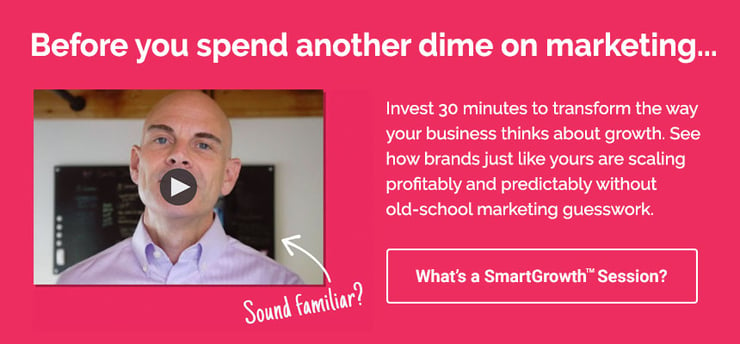Did you know that the average person spends 145 minutes on social media every day? Or that 90% of social media users follow at least one brand?
While it's no surprise that B2C and D2C brands have jumped into social media marketing with both feet, these platforms offer plenty of opportunities for B2B brands as well. For example, we know that 53% of B2B buyers get product information from social media and that LinkedIn is the most used platform for B2B marketing, with 4 of 5 B2B social media marketing leads coming through that one channel.
Without a thoughtful strategy, however, it's easy to waste both time and money on social media that simply won’t yield results. In this article, you’ll discover how to develop and implement an effective B2B social media strategy – from choosing the best platforms to creating and scheduling content consistently, to building and engaging a community online.
What Are the First Steps in Creating a B2B Social Media Strategy?
Before you register for multiple platforms or compose a single Tweet, it's vital to know what you’re trying to accomplish with social media in the first place. Is your objective brand awareness? Lead generation? Bringing more traffic to your website? Creating another channel to use for customer service? It could be one or even all of these, but whatever your goals are, they should be clearly defined and measurable so that all of your colleagues are on the same page and so the impact of your efforts can be quantified and tracked.
Based on this understanding, it’s important to also know your target audience and their social media preferences. While LinkedIn and Twitter are by far the most commonly used social media platforms for B2B, that statistic is irrelevant if you happen to be in an industry or serving a niche that prefers Instagram or TikTok. While you’re at it, try to learn what types of content your ideal customer prefers. Infographics? Short form video? Dazzling photography? In short, the better you understand your audience, the more effective your social media strategy will be.
Finally, don’t forget that there is a difference between B2C and B2B social media strategies. For one, the B2B customer journey is typically longer and involves a higher dollar investment than most B2C transactions. Plus, there are often multiple stakeholders making decisions for businesses who have to confer and agree before a sale can be made. These differences should shape the arc of your content as well as your platform selections.
What are the Key Components of a B2B Social Media Strategy?
Now that you have laid the foundation for your strategy, you can begin to determine the specific messaging, media, and platforms that will define what social media marketing will look like for your unique brand. Your B2B social media strategy should be in alignment with your overall brand positioning and marketing efforts and the look, tone, and aesthetics should be consistent as well. In other words, your social media strategy should not exist in a silo, it should be well-integrated with your marketing and business objectives.
In fact, if you are already engaged in other forms of content marketing such as blogs, podcasts, webinars, or case studies, that same content can be easily repurposed into multiple social posts – extending the reach and the benefits of those efforts and streamlining your workflow.
Finally, your B2B social media strategy should be infused with your brand’s unique value proposition and wherever possible, incorporate storytelling. Leveraging stories on social helps to personalize your brand and build connections with your followers. By keeping in mind what makes your brand different from the competition and sharing stories that resonate and stick with your audience, you can make a unique and lasting impression on current and potential customers.
How Do I Choose the Right Platforms and Content?
The best social media platforms for your B2B will be dictated by where your target audience spends the most time, the types of content they prefer to consume, and what your objectives are. Whereas LinkedIn might be an ideal platform for establishing thought leadership, Twitter may be better equipped to serve as an alternate tool for customer service inquiries.
Another factor is the kind of industry you’re in. If your product is multi-media or highly visual, YouTube and TikTok might be the best platforms to promote your brand. If you wholesale beauty products, a better choice might be Instagram or Facebook. Pick the platforms that best serve the needs of your brand and your audience and leave the rest. It’s far better to do a handful – or just one – platform really well than to do several half-heartedly.
What kinds of content should you post? Well, that depends somewhat on your industry and your audience (and sometimes the platform itself!) Some of the more common types of B2B content include thought leadership articles, case studies, infographics, and video content.
Social media is also a great place to share customer testimonials, user reviews, and other forms of social proof. Brands can go behind the scenes to show how a product is made, or to share a day in the life of the CEO or founder. Companies can host AMA (ask me anything) sessions on Facebook or Instagram live, or participate in Twitter chats around relevant topics. The options are somewhat endless, as long as the content and messaging support your goals and authentically reflect your brand.
Building and Engaging the B2B Social Media Community
By becoming strategic about B2B social media, you’ll soon find that you have an active, engaged group of followers. Keep them active and engaged with the following best practices:
- Engage with followers by responding to comments and messages
- Repost relevant user-generated content
- Leverage socially active and savvy employees for brand advocacy
- Provide timely and personalized responses to audience interactions and feedback
- Promptly address and take any negative feedback offline (out of public view)
- Explore social media listening tools to monitor brand mentions and industry trends
How Do I Know If Our Social Media Strategy Is Working?
As you get deeper into implementing your B2B social media strategy, it’s important to take a step back every now and then and make sure it’s still working in alignment with high-level business goals, and marketing KPIs. The specific metrics to track will vary depending on how you are using social media and what your objectives are, but generally speaking, you want to see your audience steadily growing (follower count) and becoming more and more engaged (views/likes, comments, and shares).
Additionally, you can measure how much traffic is coming to your website from social channels which will give you a clearer picture of how your social media efforts are stacking up against your other growth marketing strategies. This data can help you analyze which platforms and what kinds of content are resonating best with your audience and inform your strategy going forward.
There’s no question that an effective B2B social media strategy can help drive engagement, brand awareness, and lead generation for your business. But, like many content marketing efforts, social media marketing requires a consistent approach over time to yield results.
By taking the time to understand your audience, articulate your unique value proposition, and identify the best types of content and most effective platforms for your brand, you can feel confident that the time, investment, and energy you are devoting to social media marketing is not going to waste. Approaching B2B social media strategy with a blend of creativity and data-driven decision-making allows brands to generate demand and achieve success in the digital age.
At Brand Theory, we initiate every new client relationship by going through a process called the Smart Growth Intensive. This in-depth exercise helps brands get crystal clear on messaging, positioning, UVP, target audience(s), and more, laying the foundation for not only cohesive marketing messaging across channels but helping them articulate what sets them apart. If you’re ready to elevate your B2B social media strategy and watch your business grow, book a no-obligation introduction to Brand Theory today.




.png)
.png)
.png)